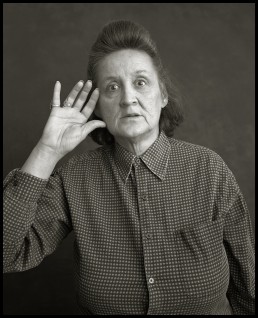Podcast Season 2: Hunger & Resilience
S2: Episode 23 - Sheryl

Episode Information
[Intro Music]
Narrator: Welcome to Hunger and Resilience, narrative histories about the complexity and experiences of hunger. A traveling exhibition and weekly podcast edited and hosted by Michael Nye, supported by the San Antonio Food Bank, Eric Cooper, executive director. We are grateful for the honesty and eloquence of every voice. Episode 23, Sheryl.
Sheryl: When I was in the state hospital in Big Spring, Texas, I learned that there were people there that had major issues just like myself. It was very scary. I was on a dorm with 15 or 20 women and different cells. There was rage, anger, there was all kinds of emotions from others going on around me. My diagnosis was manic depression. The depths of depression, to me is just feeling totally left out of everything in the world. No hope and, and no hope to get any better. No hope to, to make something of your life. And the humiliation and the outcast I felt from my own family was unbearable because they didn’t want anything to do with me. When I got out and I moved back, I remember sleeping on the ground in the pastors with trees so nobody could see me. Was so angry. I would drink so much just to escape the pain of having the family reject me. No place to live, no destination. I would totally pass out. Wake up the next day, start the same thing all over again. I dumpster dive off and on for 20, 25 years, maybe more. I remember walking one night to the dumpster, which was like five or six blocks, and I kept thinking, oh my goodness, who’s gonna be there? And it’s dark. And I was afraid, but I was really hungry. And I was thinking, what all is on this food that I’m about to eat? But I still didn’t care. I was angry. I was hurt, I was humiliated, and I was felt degraded for some reason. I didn’t want any help from no one. ’cause I was that angry. What,
Why am I in this situation? Why did this happen to me? And you can really get caught up in that. The physical pain of hunger that was hard. Your health deteriorates, your teeth, your affects your mind, your pride, your dignity, your will to live. I called my father for help. He said, I’m coming down first. I’m gonna come pick you up and then we’re gonna go buy you a car. And that’s what he did. I didn’t have anything material-wise. He’d pay my rent for me. He’d do things for me. He kept giving me these antique Chester drawers. And that turned my life around because it made me feel loved and important.
I constantly think about God. I pray a lot. One afternoon as I was walking down the alley from my house, I noticed this trashcan full of old papers and books. And there was one that caught my eye that was real old. And I picked it up and it was a Bible. And I thought, oh, yes, I found something that’s really good. And I just started sitting there and reading it. I didn’t even wait until I got home. And it had writing in it. They were had taken notes. It was almost like, you know how you find money on the ground? I found something better than that. I found something that somebody else’s thoughts and something that was old and something that was good, and that was real interesting to me. ’cause it was like going back in time.
[Outro Music]
Host: To understand another person, he must consider things from his or her point of view. Sheryl struggled with mental health, a loss of dignity, and a connection to others. When hunger and resilience exhibition traveled to the St. Louis History Museum, someone left a note on the bulletin board and it read. Sheryl, I listened. I felt the pain of your story. I understand now. You have changed my life and we have never even met. Thank you, Cheryl, for sharing your very personal story, your insights, your voice, and your presence. You can go to my website, michaelnye.org/podcast for portraits and transcripts. Thank you so much for listening.
